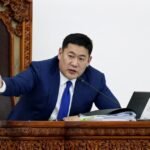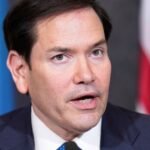Trump Deploys Justice Dept. to Ramp Up Attacks on Higher Ed
The Department of Justice has always had a hand in American higher education, ensuring that colleges use taxpayer dollars properly and comply with federal statute. But the nation’s chief law enforcement agency entered unprecedented territory late last month when Attorney General Pam Bondi and her civil rights team pressured University of Virginia president James Ryan to step down because of the way he had handled diversity, equity and inclusion efforts on campus.
Forcing out a university president over curricular decisions escalates the DOJ’s involvement in higher ed to a whole new level, legal experts say.
“There’s nothing normal about any of what’s going on here,” said Jodie Ferise, a former college professor, administrator and now partner at Church Church Hittle + Antrim, a law firm based in Indiana. “It’s such a carefully orchestrated attack that I’ve found myself thinking it’s almost impressive in a demented way,” she added. “This feels like fear-mongering.”
President Donald Trump has only been back in office for about 170 days, but he and his administration have introduced a slew of executive orders, frozen billions of dollars in federal funding and launched a multitude of investigations—all of which have had a dramatic chilling effect on higher education institutions across the country. And while the Departments of Education and Health and Human Services have been involved, the Department of Justice has led much of this work.
“It’s perfectly appropriate for the DOJ to play a more assertive role,” said Frederick Hess, director of education policy studies at the American Enterprise Institute, a right-leaning think tank. “But by enlisting the DOJ as it has, the Trump administration is now ramping things up several more notches. This is a problem in its own right and a troubling development, especially given our tit-for-tat politics.”
It’s perfectly appropriate for the DOJ to play a more assertive role. But by enlisting the DOJ as it has, the Trump administration is now ramping things up several more notches.”
—Frederick Hess, American Enterprise Institute
In addition to sending letters pressuring UVA, the DOJ has declared it will investigate alleged civil rights violations as fraud and probed universities in California for violating the Supreme Court ruling on affirmative action. Under Bondi, the department has also focused heavily on the participation of transgender women in women’s athletics and piloted the Joint Task Force on Anti-Semitism.
Conservative groups such as America First Legal, an advocacy organization founded by Trump’s deputy chief of staff Stephen Miller, argue that left-leaning higher education institutions have long put certain groups—including white men, cisgender women athletes and Jewish students—at a disadvantage. As a result, they say, colleges have repeatedly violated Titles VI and VII of the Civil Rights Act of 1964, which prohibit discrimination in federally funded programs and employment based on race, color, religion, sex and national origin, as well as Title IX of the Education Amendments of 1972, which prohibits sex-based discrimination in educational programs. By investigating colleges for alleged antisemitism, sexism and DEI programming, they argue, the DOJ is simply fulfilling its intended purpose: to enforce the law.
“This week’s developments make [it] clear: Public universities that accept federal funds do not have a license to violate the Constitution,” AFL attorney Megan Redshaw said in a statement to PBS. “They do not get to impose ideological loyalty tests, enforce race and sex-based preferences, or defy lawful executive authority.”
Although the Department of Education’s Office for Civil Rights normally handles such cases, higher education experts say it’s not the DOJ’s involvement they find objectionable; it’s the speed and force with which the department has acted.
While traditional DOJ cases can take years to resolve, Bondi’s agency has launched and concluded investigations in a matter of months or even weeks, leaving little room for appeal, negotiation or settlement. That makes it difficult to overlook the possibility that Trump’s efforts to enforce the law on college campuses are part of his calculated clench for control, higher education advocates say.
“The DOJ has been involved in higher education before. Up until now, though, I just don’t have a sense that it’s ever been intentionally weaponized for political purposes,” said Peter McDonough, vice president and general counsel at the American Council on Education. “We certainly can feel the intensity of focus and the desire for political messaging. There’s a fear factor that clearly has been a motivator and an objective.”
‘Regulatory’ or ‘Political’
Every legal expert Inside Higher Ed spoke with noted that in recent years the Department of Justice has reasonably held American colleges and universities accountable in a number of cases, spanning both Republican and Democratic administrations.
The issues at hand varied; some cases focused on antitrust law in an effort to ensure competitive colleges weren’t colluding over financial aid formulas or using illegal recruitment incentives. Others homed in on policies concerning foreign influence on university research.
But all focused largely on the business of higher education, experts say—not on campus culture or curriculum, like the cases brought under the current administration.
Much of the DOJ’s work in higher education—both during prior administrations and under Trump—relies on the False Claims Act, a statute that imposes penalties on any person or contractor who knowingly submits false claims to the government. The law allows private citizens, or whistleblowers, to file suits on behalf of the government and is designed to prevent the use of taxpayer dollars for fraudulent causes.
Timothy Heaphy, a partner at Willkie Farr & Gallagher, who previously served as general counsel at UVA and has spoken out against the DOJ’s recent actions, told Inside Higher Ed he dealt with many government cases during his time at the flagship university, but they all concerned “regulatory requirements.” None involved the kinds of civil rights issues at the core of the recent Trump investigations, which typically fall within “the province of the Department of Education,” he said.
John Pistole, president emeritus of Anderson University and former deputy director of the Federal Bureau of Investigation, said that in his experience the DOJ’s focus on higher education has largely been one of “guidance.” While the extent of that guidance varied from president to president, he said, the focus was always on helping colleges follow the law.
That’s no longer the case, he said.
“The current Trump administration is obviously taking a very aggressive approach to interpreting and perhaps reinterpreting the law,” Pistole said. What was once an “even-handed approach to investigations” that “focused on the facts” is now a targeted attack on certain political perspectives.
“That’s been the change that’s been so challenging for college presidents, chancellors and boards,” he added. “They have to say, ‘Are we complying with not only the law, but what might be perceived as a contrary political position?’”
The Department of Justice has denied that its approach to postsecondary institutions is politically charged.
When CNN anchor Jake Tapper asked Harmeet Dhillon, assistant attorney general for civil rights, whether the UVA president resigned in response to a demand from the DOJ, Dhillon said she “wouldn’t agree with that.”
However, she said that she expressed to “leaders at UVA that we significantly lacked confidence” in the institution’s commitment to dismantling DEI programs. “There’s a lot of money on the line here,” she added. “We can’t be giving out billions of dollars to organizations and institutions that refuse to follow federal law—that’s irresponsible.”
In a statement to Inside Higher Ed, Dhillon said, “The United States Department of Justice has a zero-tolerance policy toward illegal discrimination in publicly-funded universities. We have made this clear in many ways to the nation’s most prominent institutions of higher education, including the University of Virginia. When university leaders lack commitment to ending illegal discrimination in hiring, admissions, and student benefits—they expose the institutions they lead to legal and financial peril. We welcome leadership changes in higher education that signal institutional commitment to our nation’s venerable federal civil rights laws.”
‘A Verdict Without a Trial’
Regardless of the intent behind the DOJ’s recent actions, the result, most higher education sources agreed, is a kind of coercion.
“What we’re seeing here is less about enforcement of laws and more about government terrorism,” said Ferise of the Indiana law firm. “By definition terrorism is using intimidation to unlawfully pursue some kind of political gain or vendetta, and I can’t see how this is anything other than that.”
What we’re seeing here is less about enforcement of laws and more about government terrorism.”
—Jodie Ferise, partner at Church Church Hittle + Antrim
McDonough from ACE recalled his interactions with the DOJ during the first Trump administration, when the people he met were “very sincerely” asking questions, focused on “back and forth” engagement with college leaders.
But now that due process is gone, he said. “There’s essentially been a verdict without a trial.”
AEI’s Hess also criticized the administration’s tactics. “It’s vital that the DOJ pursue these actions with full regard for due process, the letter of the law and transparency,” he said.
Moving forward, DOJ officials may still have full authority to open new investigations if they believe colleges are breaking the law, McDonough said. The real question becomes whether the public can trust their conclusions.
“In other words, are we sliding down a slippery slope where our country’s sense of confidence in the United States Department of Justice is being impacted by a perception that it’s doing the bidding of the president and not of the rule of law?” he asked.
Pistole said that while U.S. universities are clearly in an era of “great change,” they still have some leverage in how they respond.
“What executive orders will be upheld as they are challenged? And which will be overturned or determined not only as unconstitutional, but political payback?” he asked.
(This story has been updated to include a statement from assistant attorney general Harmeet Dhillon.)
You may be interested

Education Department releasing billions in remaining withheld grant money for schools
new admin - Jul 26, 2025Washington — The Trump administration is releasing billions of dollars in grants to schools for adult literacy, English language instruction…

Top 5 films better than Marvel’s latest Fantastic Four and Superman | Films | Entertainment
new admin - Jul 26, 2025This article contains affiliate links, we will receive a commission on any sales we generate from it. Learn more The…

With cosmetic surgery chains growing, lawsuits reveal allegations of injuries and deaths
new admin - Jul 26, 2025[ad_1] IE 11 is not supported. For an optimal experience visit our site on another browser.Flash flooding and extreme heat…
































